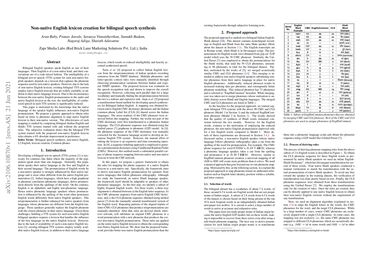Non-native English lexicon creation for bilingual speech synthesis
Bilingual English speakers speak English as one of their languages. Their English is of a non-native kind, and their conversations are of a code-mixed fashion. The intelligibility of a bilingual text-to-speech (TTS) system for such non-native English speakers depends on a lexicon that captures the phoneme sequence used by non-native speakers. However, due to the lack of non-native English lexicon, existing bilingual TTS systems employ native English lexicons that are widely available, in addition to their native language lexicon. Due to the inconsistency between the non-native English pronunciation in the audio and native English lexicon in the text, the intelligibility of synthesized speech in such TTS systems is significantly reduced. This paper is motivated by the knowledge that the native language of the speaker highly influences non-native English pronunciation. We propose a generic approach to obtain rules based on letter to phoneme alignment to map native English lexicon to their non-native version. The effectiveness of such mapping is studied by comparing bilingual (Indian English and Hindi) TTS systems trained with and without the proposed rules. The subjective evaluation shows that the bilingual TTS system trained with the proposed non-native English lexicon rules obtains a 6% absolute improvement in preference.
PDF Abstract
